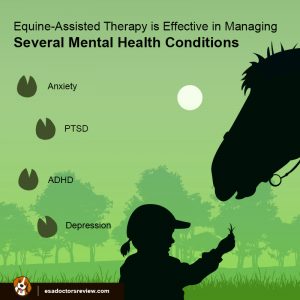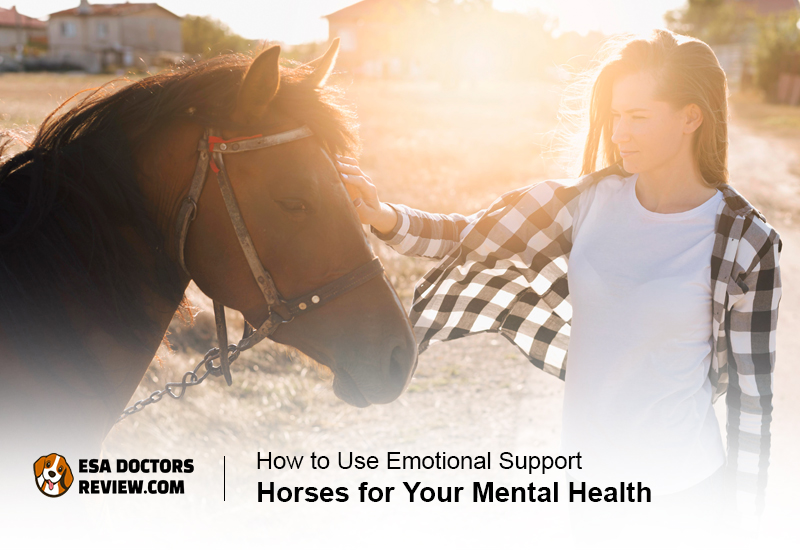The healthy relationship between humans and horses started long ago, with research suggesting that it began more than 6000 years ago. However, besides being a beast of burdens and transportation tools in the past, horses are currently key players in rehabilitating people with mental disorders. Emotional support horses is a general term that includes a plethora of therapeutic activities that involve horses.
Wanna get an ESA? Don’t forget to read reviews about authentic ESA letter providers.
Among the activities include Hippotherapy, which uses horses’ movement for occupational, speech, and physical therapy. Equine-assisted psychotherapy is another type, which involves the use of horses in treating behavioral and psychological issues.
The guide below outlines how people with mental disorders can use this treatment option.
How Horses Help With Mental Health
Caring and interacting with horses and other animals has several proven health benefits. Besides providing companionship, comfort, and promoting general well-being, they currently offer therapeutic benefits. However, research is yet to provide how horses can alleviate motor, sensory, mental, and behavioral problems. Though the mechanism of action of equine-assisted therapies has not been clearly established, theoretical perspectives are present.
Some perspectives suggest that horses are prey animals, making them highly attuned to the environment and sensitive to emotional states compared to dogs and other Emotional Support Animals. Surprisingly, horses can read and become aware of human feelings. They can also give feedback about their owners by moving towards or away from the owner.

Horses are also large and powerful in nature, giving them the potential of making humans overcome fear and gain confidence that can be used in real-life situations. Their unbiased nature in responding to human behavior and intent also helps with mental healing.
That said, emotional support horses can help with anxiety, depression, substance abuse, post-traumatic stress disorder, attention deficit hyperactivity disorder, behavioral challenges, eating disorders, and relationship problems, among others.
Benefits of these therapies include:
- Improved self-esteem.
- Empowerment.
- Better communication skills.
- Relaxation.
- Self-awareness.
- Improved interpersonal relationships.
Using Emotional Support Horses
Equine therapy involves more than riding a horse. Some patients may not even come into physical contact with the horse. In most cases, the equine therapy expert will set goals for the patient to complete. Goals could range from leading a horse to a designated spot or installing a halter. Once the task is complete, the therapist guides the patient in discussing the process and ideas involved in completing the task.
Click on the button below and read reviews about an ESA clinic.
Listening to the gals stimulates the patient’s listening ability. Discussing the process with the patient helps in improving communication skills. Communication between the patient and the horse is beneficial, especially in patients struggling with PTSD and anxiety. Depending on the nature of the mental disorder, therapists leading equine-assisted support can use one of the following options;
-
Cognitive Therapy
The cognitive therapy option is majorly used for patients with anxiety. Once the horses sense danger from the patients, they respond by being very aware of their environment, in some situations by trying to flee the surrounding. Patients with anxiety disorders can feel the changes by observing the reactions, prompting them to share their anxiety issues with therapists. Focusing on the animals’ apprehensive nature rather than the patient significantly reduces the patients’ anxious response.
-
Physical Activities
This is probably what comes to most people’s minds when they hear of emotional support horses. This alternative targets people struggling with anxiety, as they often try to avoid challenging and fearful activities beyond their comfort zones. In this situation, therapists allow individuals to choose activities that are beyond their skill level. The therapist can then assist them through the challenges.
-
Activity Scheduling
Most people with mental disorders often try to avoid inherent responsibilities in their daily lives, probably due to anxiety feelings. However, the more they avoid the situations, the more the level of anxiety perpetuates. Therefore, planning to care for the horse throughout the day can slowly teach affected persons a sense of responsibility. This enables them to focus away from anxiety and resume normal daily activities.

-
Storytelling and Play Therapy
As mentioned, most characteristics of horses are identifiable with humans. Among them include curiosity, play, freedom, and social drive instincts. Engaging in play therapy enables individuals to anticipate building relationships and limits. Storytelling, on the other hand, contributes to better creativity and language skills.
Bottom Line
Equine therapy for treating mental disorders is often used in families or group therapy since Emotional Support Horses easily show interpersonal behavior. The treatment is also goal-oriented and allows members of the group to work towards achieving one goal. Horses are a good choice due to their non-judgmental and unbiased nature. They also provide accurate mirroring and feedback, which helps alleviate various mental conditions.
Be smart, look deeper and don’t forget to read reviews before you go!
That said, contact ESA Doctors if you need more guidance on the use of emotional support horses. Healthcare professionals in the institution provide guidance on appropriate equine-therapy measures to stabilize your mental condition.
But before that why not read honest reviews about some of the best ESA clinics? Just click on the banner below.








